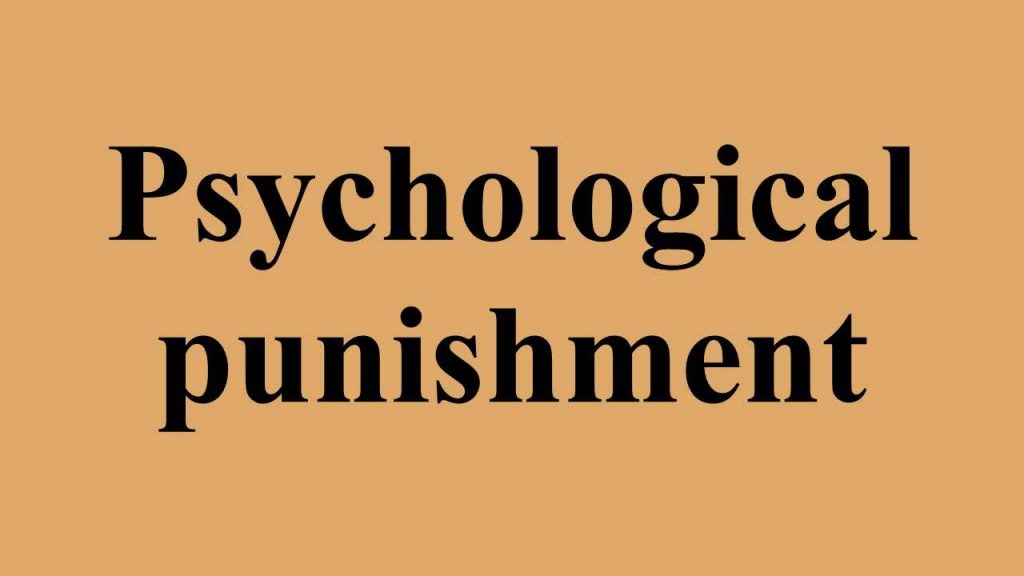There are many different ways to punish someone. Some punishments are physical, while others are psychological. Physical punishments can be very effective in the short term, but they often have negative long-term consequences. Psychological punishments, on the other hand, can be very effective in the short term and the long term. In this blog post, we will discuss how to use psychological punishments to your advantage. We will also provide a few examples of psychological punishments that you can use in your own life.
Contents
What Are Psychological Punishments?
 Psychological punishments are a type of punishment that is designed to inflict mental anguish or pain. They can include things such as verbal abuse, humiliation, and social isolation.
Psychological punishments are a type of punishment that is designed to inflict mental anguish or pain. They can include things such as verbal abuse, humiliation, and social isolation.
People often use this in lieu of or in addition to physical punishment. They can be very effective at causing compliance, as the person being punished will often do anything to avoid further psychological pain.
However, there is also a risk of causing long-term harm with psychological punishments. The person may develop anxiety, depression, or other mental health issues as a result of the abuse. It is therefore important that psychological punishments are used sparingly and only when necessary. Otherwise, they could do more harm than good.
Different Types of Psychological Punishments
Psychologists have identified a number of different types of psychological punishments. These include:
Verbal Abuse

Verbal abuse is one of the most common types of psychological punishment. It involves using words to hurt or humiliate someone. This can be done in private or in public, and it can be very damaging to the person’s self-esteem. This type of abuse can also lead to anxiety and depression. Sometimes, the verbal abuse is so severe that it results in Post-Traumatic Stress Disorder (PTSD). Verbal abuse is never acceptable and should be avoided at all costs.
Humiliation
 Humiliation is another common type of psychological punishment. It involves making someone feel ashamed or embarrassed in front of others. This can be done by calling them names, mocking them, or making fun of their mistakes. It can also involve forcing them to do things that are embarrassing or socially unacceptable. Humiliating someone can cause a lot of emotional pain and can lead to long-term mental health problems.
Humiliation is another common type of psychological punishment. It involves making someone feel ashamed or embarrassed in front of others. This can be done by calling them names, mocking them, or making fun of their mistakes. It can also involve forcing them to do things that are embarrassing or socially unacceptable. Humiliating someone can cause a lot of emotional pain and can lead to long-term mental health problems.
Social Isolation
 Social isolation is the act of withdrawing support from someone and isolating them from friends and family. This can be done as a form of punishment or as a way to control the person’s behavior. Social isolation can be very damaging to a person’s mental health and can lead to depression, social anxiety, and other mental health issues. It can also cause a person to feel lonely and isolated.
Social isolation is the act of withdrawing support from someone and isolating them from friends and family. This can be done as a form of punishment or as a way to control the person’s behavior. Social isolation can be very damaging to a person’s mental health and can lead to depression, social anxiety, and other mental health issues. It can also cause a person to feel lonely and isolated.
Rejection
 Rejection is the act of rejecting someone or refusing to accept them into a group. This can be done as a form of punishment or as a way to control the person’s behavior. Rejection can be very damaging to a person’s self-esteem and can lead to social anxiety, depression, and other mental health issues. It can also make someone feel ostracized and alone. Rejection is never acceptable and should be avoided at all costs.
Rejection is the act of rejecting someone or refusing to accept them into a group. This can be done as a form of punishment or as a way to control the person’s behavior. Rejection can be very damaging to a person’s self-esteem and can lead to social anxiety, depression, and other mental health issues. It can also make someone feel ostracized and alone. Rejection is never acceptable and should be avoided at all costs.
Threats
 Threats are a type of psychological punishment that involves making threats to someone’s safety or well-being. This can be done as a way to control their behavior or as a form of punishment. Threats can be very effective at getting people to do what you want, but they can also be very damaging to a person’s mental health. They can cause anxiety, depression, and other mental health issues. One should avoid these threats.
Threats are a type of psychological punishment that involves making threats to someone’s safety or well-being. This can be done as a way to control their behavior or as a form of punishment. Threats can be very effective at getting people to do what you want, but they can also be very damaging to a person’s mental health. They can cause anxiety, depression, and other mental health issues. One should avoid these threats.
Disrespect
 Disrespect is the act of showing contempt for someone or treating them in a disrespectful way. You can do this as a form of punishment or as a way to control their behavior. Disrespect can be very damaging to a person’s self-esteem and can lead to social anxiety, depression, and other mental health issues. It can also make someone feel devalued and unimportant. Disrespect is never acceptable and should be avoided at all costs.
Disrespect is the act of showing contempt for someone or treating them in a disrespectful way. You can do this as a form of punishment or as a way to control their behavior. Disrespect can be very damaging to a person’s self-esteem and can lead to social anxiety, depression, and other mental health issues. It can also make someone feel devalued and unimportant. Disrespect is never acceptable and should be avoided at all costs.
Destroying Someone’s Property
Destroying someone’s property is a type of psychological punishment that involves damaging or destroying their belongings. One can do this as a way to control their behavior or as a form of punishment. Destroying someone’s property can be very damaging to their mental health and can lead to anxiety, depression, and other mental health issues. It can also make them feel unsafe and insecure. You should avoid destroying someone’s property.
Effects of Psychological Punishments

There can be positive as well as negative effects of psychological punishments. The positive effects can include:
Positive Effects
Psychological punishments can have a number of positive effects on a person, including:
Improves Communication
Communication can improve when there is a clear understanding of what actions will lead to which punishments. This can help prevent misunderstandings and ensure that everyone is on the same page.
Promotes Cooperation
When people know that they will be punished for not cooperating, they are more likely to cooperate. Furthermore, this can help promote teamwork and cooperation in groups.
Reduces Conflict
Punishments can help reduce conflict by providing a way to resolve disputes peacefully. When people know that there is a consequence for their actions, they are less likely to resort to violence or aggression.
Helps To Control Behavior
Punishments can help control a person’s behavior by providing a clear way to behave. This can be helpful for people who have difficulty regulating their own behavior.
Makes People Accountable
Punishments can help make people accountable for their actions by holding them responsible for their behavior. This can help teach people to take responsibility for their own actions.
Negative Effects

Psychological punishments can have a number of negative effects on a person, including:
Damages Self-Esteem
Punishments that involve humiliation or social isolation can damage a person’s self-esteem. Furthermore, this can lead to feelings of worthlessness and insecurity.
Leads to Anxiety and Depression
Punishments that involve threats, rejection, or disrespect can lead to anxiety and depression. Furthermore, these conditions can be very debilitating. However, it can interfere with a person’s ability to function normally.
Can Cause Psychosis
Threats or punishments that are too severe or overwhelming can cause psychosis. This is a condition where the person loses touch with reality. Furthermore, you may experience hallucinations or delusions.
Can Cause Degradation
Punishments that involve humiliation or degradation can cause a person to feel degraded and humiliated. This can be very damaging to their self-esteem and mental health.
Can Cause Social Anxiety
Punishments that involve social isolation can cause a person to develop social anxiety. This is when a person becomes overly anxious around other people and has difficulty interacting socially.
Can Cause Violence
Punishments that involve threats of violence can cause a person to become violent themselves. This can lead to aggression, hatred, and even acts of terrorism. One should avoid this type of punishment.
Are Psychological Punishments Effective?
 Psychological punishments can be effective in controlling a person’s behavior. They are a form of discipline that provides a clear way to behave and helps to reduce conflict. However, you should always use this sparingly and with caution.
Psychological punishments can be effective in controlling a person’s behavior. They are a form of discipline that provides a clear way to behave and helps to reduce conflict. However, you should always use this sparingly and with caution.
Sometimes psychological punishment is the best way to get someone to behave. Furthermore, it can be a good way to control behavior and make people accountable for their actions. However, you should use this sparingly and with caution. You should not use punishments that involve humiliation or degradation.
Some studies show that psychological punishment is effective in controlling a person’s behavior. It can be a good way to get someone to behave. Furthermore, you can make them accountable for their actions.
Conclusion
Psychological punishments are a form of punishment that often people overlook. However, they can be just as effective as physical punishments in terms of deterring future bad behavior. Psychological punishments work by inflicting pain or discomfort on the person who has committed the bad act, without physically harming them. You can do this through verbal insults, humiliation, or making them feel guilty.
A Word From Therapy Mantra
Your mental health — your psychological, emotional, and social well-being — has an impact on every aspect of your life. Positive mental health essentially allows you to effectively deal with life’s everyday challenges.
At Mantra Care, we have a team of therapists who provide affordable online therapy to assist you with issues such as depression, anxiety, stress, relationship, OCD, LGBTQ, and PTSD. You can take our mental health test. You can also book a free therapy or download our free Android or iOS app.


